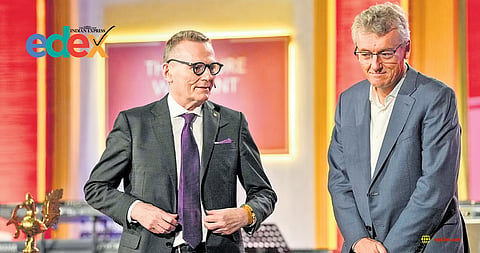

Nobel Prize Dialogue Bengaluru convened Nobel laureates James Robinson (Economic Sciences, 2024), and David MacMillan (Chemistry, 2021) alongside other experts at the Indian Institute of Science (IISc) on Monday, November 3, to explore pathways to a sustainable and equitable future.
The dialogue was hosted by Nobel Prize Outreach in partnership with Tata Trusts.
Robinson on development
James Robinson opened the proceedings, rejecting the notion of a Western “hierarchy” that frames development as a “one-way street.”
He advocated for “multi-way junctions” enabling nations to exchange lessons mutually.
MacMillan on Organocatalysis
David MacMillan explained organocatalysis which is the use of abundant, renewable organic compounds instead of metals for chemical reactions that earned him the 2021 Nobel.
“We’re one catalytic reaction away from solving climate change. We have to do a better job of explaining to the world how important these types of scientific areas are – because we really are that close,” he said.
Panel on urban governance
Indian economist Montek Singh Ahluwalia joined a session on sustainable cities, lamenting structural flaws in urban administration.
“Citizens of Bengaluru or of any city in India (unfortunately) do not exist in a system that elects a mayor for the city who is in complete (and sovereign) charge of the city,” he rued, adding that hope for a better world must be rooted in science and knowledge, rather than the exclusionary ideology that is on the rise in the US.
Tata Trusts CEO Siddharth Sharma emphasised human capital as India’s core asset.
“India’s greatest wealth lies not just in its natural resources, but in the power of its people and their capacity to learn. We are well on our way to being the third largest economy in the world. The future envisages justice – social, economic, and political. To achieve this, we must empower the youth and create ecosystems fuelling innovation for the people who need it the most.”
